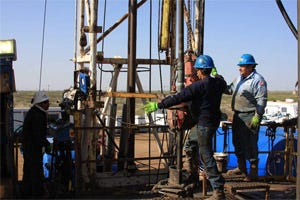Inhofe on EPA’s Regulatory Methane Proposal

U.S. Sen. Jim Inhofe (R-Okla.), chairman of the U.S. Senate Environment and Public Works (EPW) Committee, released the following statement today on the Environmental Protection Agency's (EPA) plan to impose new methane regulations to stifle the U.S. oil and gas industry: “EPA’s new proposal to regulate methane emissions is not only unnecessary, but another example of the administration’s punitive expansion of their war on fossil fuels," Inhofe wrote. "The oil and gas industry has proven success in reducing methane emissions on their own, even while increasing production levels significantly. The administration’s own data reveals that there has been a decrease in methane emissions from domestic energy producers. The miniscule fraction of greenhouse gas emissions made up by methane emissions from oil and gas production makes this yet another regulation from the Obama administration that will have no tangible impact on reducing greenhouse gas emissions.

Oklahoma Senator Jim Inhofe "As Chairman of the Senate EPW Committee, I plan on conducting rigorous oversight of this rule as it moves forward and will hold a hearing on this subject in the fall. Our committee will take action to follow up on previous oversight letters and hearings where industry leaders from Oklahoma and across the nation have testified on EPA’s misuse of methane data and their ongoing efforts to attack a thriving, critical domestic industry. "I look forward to joining my colleagues in coming months to fight back on the administration’s attempt to continue punishing American workers and families to further their costly climate agenda.” On June 11, Sen. Jim Inhofe led Sens. Lisa Murkowski (R-Alaska), chairman of the U.S. Senate Energy and Natural Resources (ENR) Committee, and Sens. David Vitter (R-La.), John Barrasso (R-Wyo.), Jeff Sessions (R-Ala.), Shelley Moore Capito (R-W.Va.), and Roger Wicker (R-Miss.), in a letter to President Obama opposing new federal mandates regulating methane emissions from the oil and natural gas sector. The full text of the letter can be read here.

On March 20, Inhofe introduced S. 828, The Fracturing Regulations are Effective in State Hands (FRESH) Act, which would recognize hydraulic fracturing as a commercial practice and keep regulations under state management. On February 12, Inhofe introduced S. 490, the Federal Land Freedom Act of 2015, which would give states the authority to establish programs to lease, permit, and regulate the development of all forms of energy resources, including renewables, on federal lands within their border. On June 19, 2012, Darren Smith, environmental manager at Devon Energy Corporation, testified before the Senate EPW Committee exposing EPA’s flawed analysis behind air regulations on the oil and natural gas industries. Smith also explained that EPA’s “misperception of initial production from gas wells has ‘led to a drastic overestimate of methane emissions from hydraulically fractured gas wells’ and this has allowed EPA to justify the promulgation of new air standards for the natural gas industry.’” To watch the full testimony, click here. This is EPA’s fourth attempt to regulate the oil and gas industry in U.S. Indian territories, and was the subject of an advanced notice of proposed rulemaking last year. The Oklahoman also features a piece today on the issue by Paul Monies. Monies writes:
Emissions and leaks of methane from new natural gas wells and other equipment would be limited under a proposed rule released Tuesday by the Environmental Protection Agency. The proposal would cut methane emissions in the oil and gas sector 40 to 45 percent from 2012 levels by 2025, EPA said. Methane is a greenhouse gas that is 25 times more potent than carbon dioxide in the atmosphere. The agency said the proposal, directed at new and modified sources, is expected to reduce emissions by 340,000 to 400,000 short tons of methane in 2025. That's the equivalent of reducing 7.7 million to 9 million metric tons of carbon dioxide. The proposal also targets releases of volatile-organic compounds, harmful gases that can come from energy production. "Today, through our cost-effective proposed standards, we are underscoring our commitment to reducing the pollution fueling climate change and protecting public health while supporting responsible energy development, transparency and accountability,” EPA Administrator Gina McCarthy said in a news release. The proposal drew quick opposition from energy industry groups, while some environmental groups said it didn't go far enough because it didn't cover existing wells. "Setting the first national standards for methane emissions from the oil and gas industry is an important move, but it can’t be the last," said Fred Krupp, president of the Environmental Defense Fund. "This proposal addresses methane emissions from newly built and modified oil and gas operations, but not from the existing facilities that account for all of today's emissions and will still account for 90 percent of the problem by 2018." The American Petroleum Industry said the proposed rules were unnecessary because the oil and gas industry already has an incentive to reduce methane emissions. "The oil and gas industry is leading the charge in reducing methane," said API President and CEO Jack Gerard. "The last thing we need is more duplicative and costly regulation that could increase the cost of energy for Americans. Even as oil and natural gas production has surged, methane emissions from hydraulically fractured natural gas wells have fallen nearly 79 percent since 2005, and CO2 emissions are down to 27-year lows. This is due to industry leadership and significant investments in new technologies."



